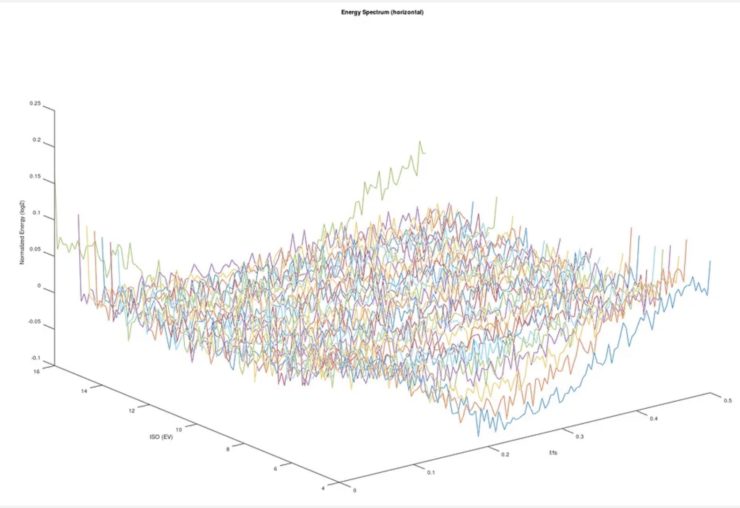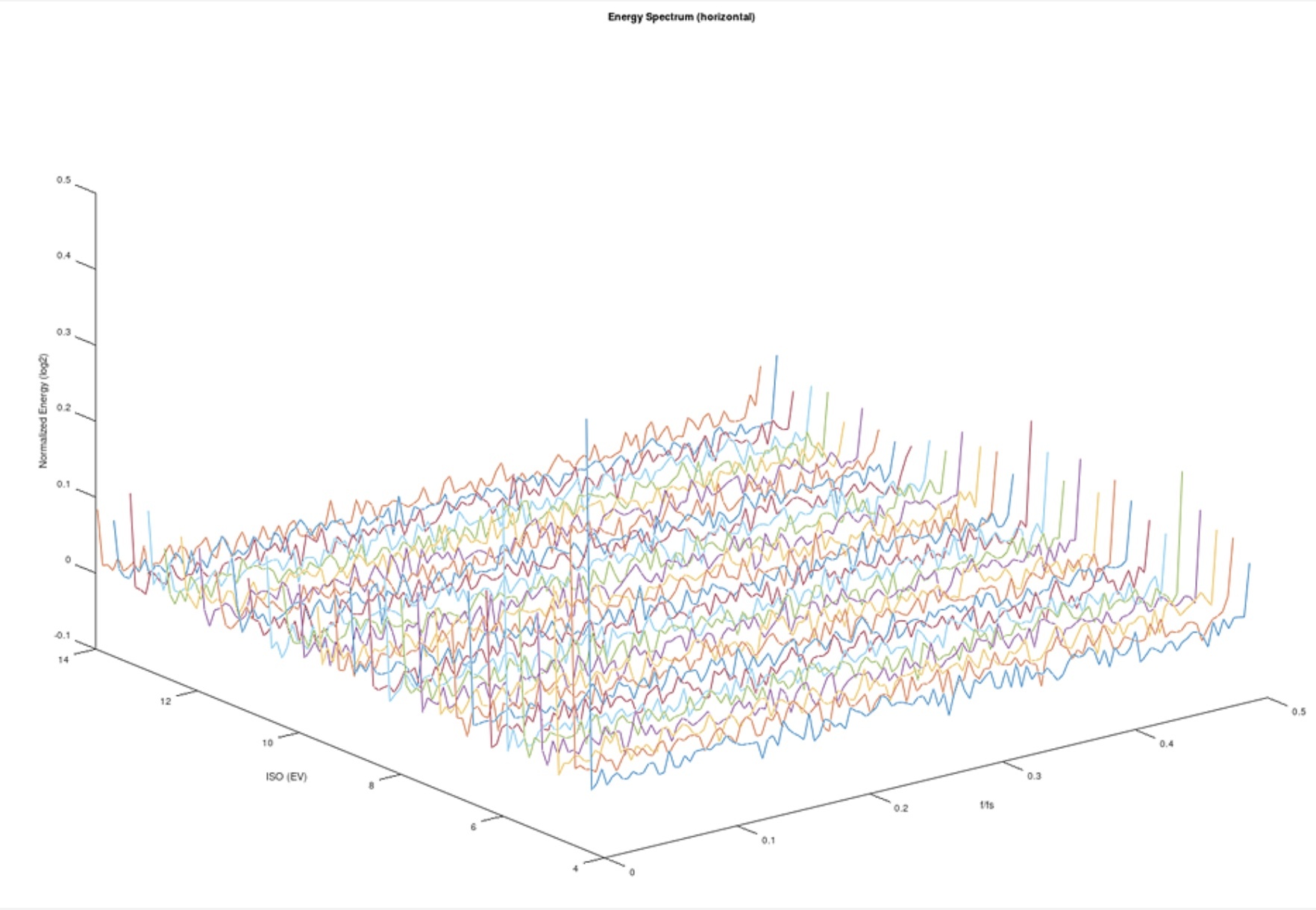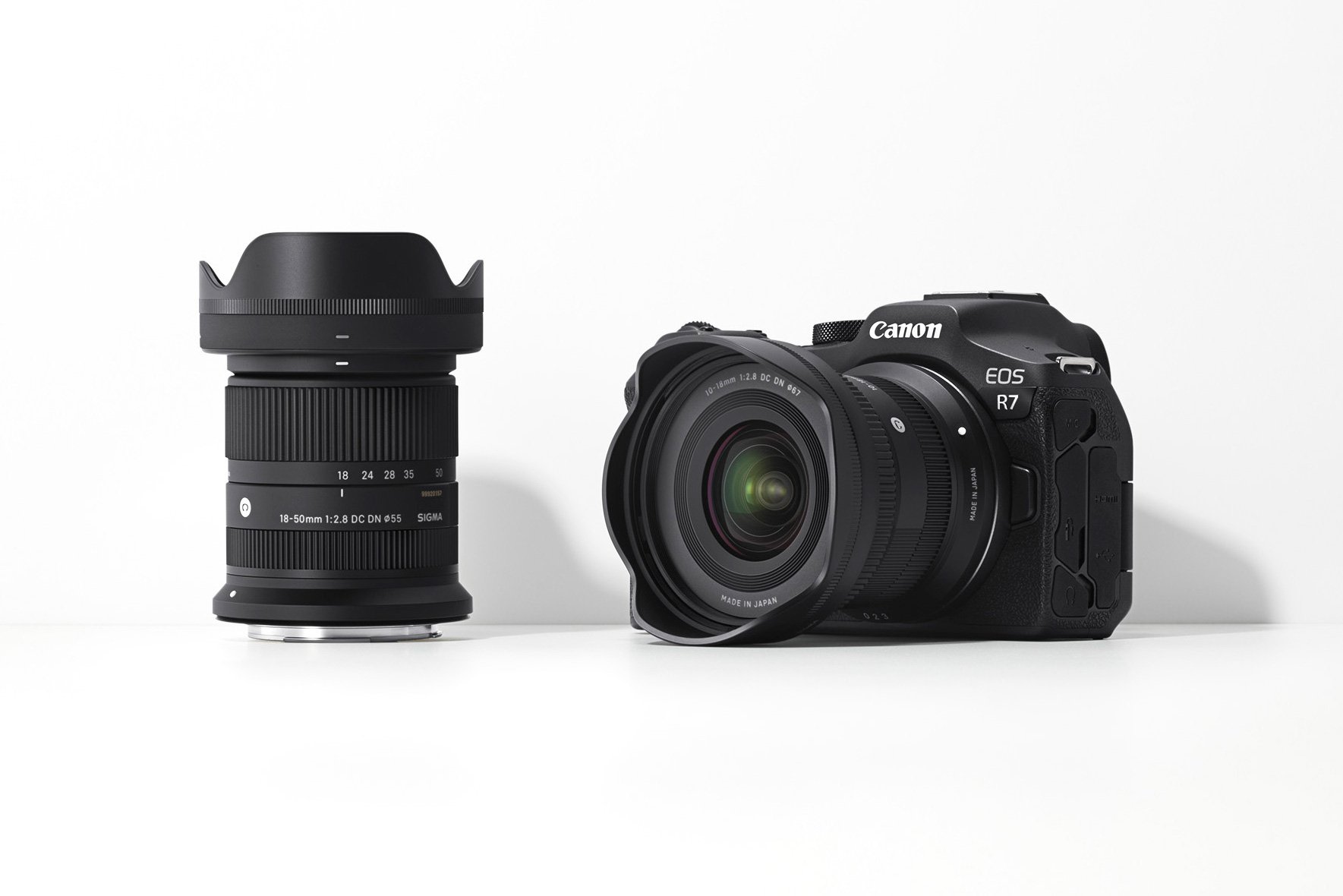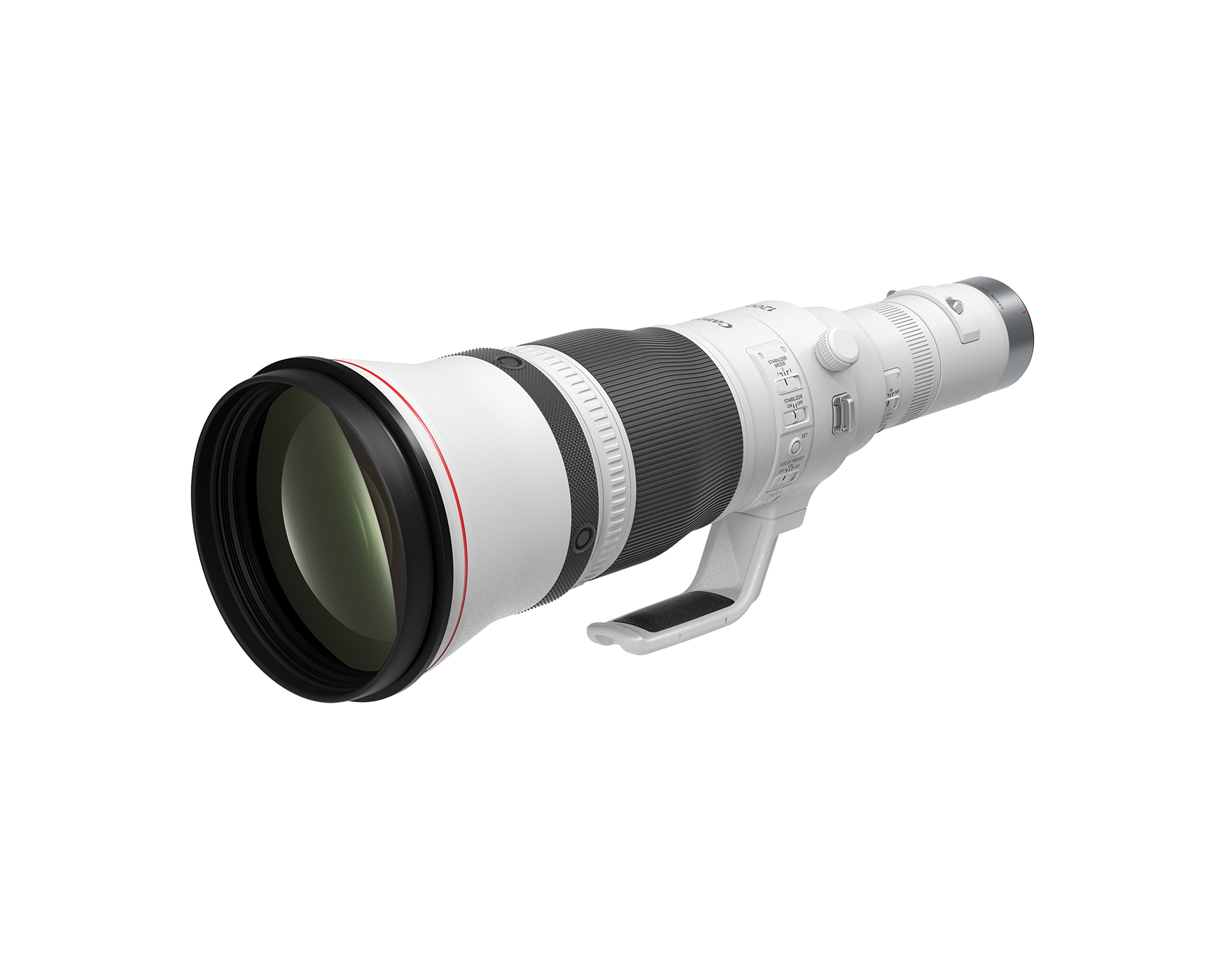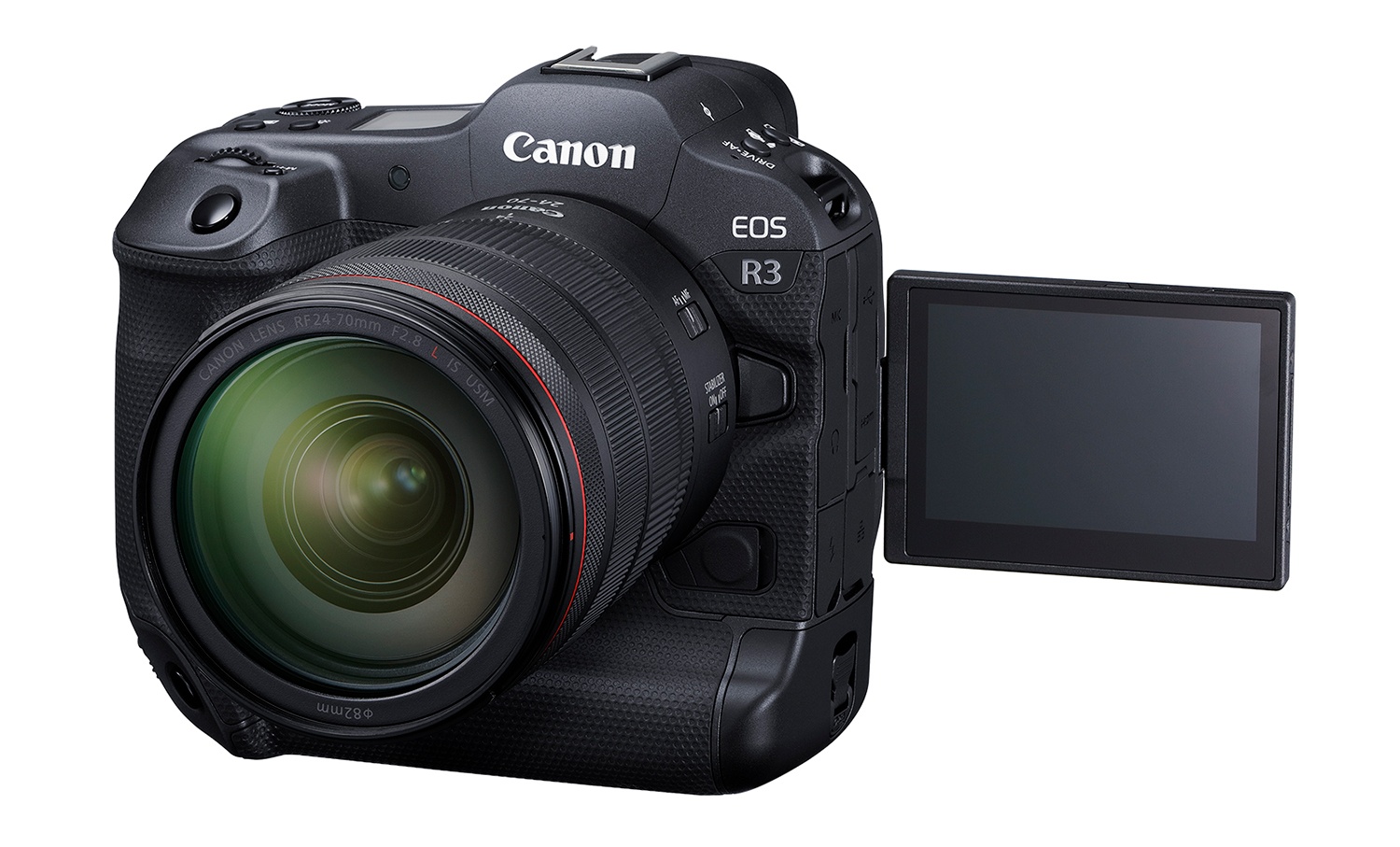I guess many of us were waiting for this: the possibility to use Sigma's excellent…
Can The Canon EOS R3 Noise Reduction Not Been Turned Off?
It seems the noise reduction on the Canon EOS R3 can not be turned off.
Based on sensor data collected by Photons to Photos, asobinet.com suggests the noise reduction on the Canon EOS R3 can not be turned off. They compared sensor data form the Leica M11 vs the Canon EOS R3. The image below is for the Leica M11, the image on top refers to the Canon EOS R3. Both images show the energy spectrum at all ISO settings. You can clearly see that the M11 sensor data is flat while the sensor data for the EOS R3 shows some prominent signal processing applied. According to asobinet, the signal processing is noise reduction.
Is this bad?
You can download the Canon EOS R3 user manual from Canon. Or you might read it online. A technical brochure about the EOS R3 is available. You can watch the EOS R3 live-stream again here. More Canon EOS R3 review stuff is listed here. We put together some interesting videos about the EOS R3, listed here. Be sure to check Gordon Laing’s in-depth review of the EOS R3, part 1 and part 2. Oh, and don’t forget to listen how the R3’s 30fps sound. Canon EOS R3 product description after the break.
Order in the USA ($5,999):
B&H Photo | Adorama
All Canon EOS R3 world-wide order links:
America: B&H Photo, Adorama, Amazon USA, Amazon Canada, Canon Canada, Canon USA
Europe & UK: Amazon DE, Amazon UK, Amazon IT, Canon IT, WEX Photographic, Canon FR, Canon UK, Canon DE
Built for speed, versatility, and reliability, the Canon EOS R3 combines the technology from their mirrorless EOS R system with the robustness and performance you’d expect from a flagship DSLR. Revolving around a new full-frame stacked sensor, updated AF performance, and refined body design, the EOS R3 is first 3-Series camera since the film era and plants itself as a fast-shooting, flexible, and contemporary mirrorless camera.
Among the most significant technologies in the R3 is the 24.1MP stacked sensor which affords truly fast readout speeds to help reduce rolling shutter distortion and benefit fast continuous shooting and video recording applications. This full-frame BSI CMOS sensor is also benefitted by an updated DIGIC X processor, which helps boost the overall speed for up to 30 fps continuous shooting with an electronic shutter, 6K 60p raw and 4K 120p video recording, and intelligent Dual Pixel CMOS II autofocus with Eye Control AF for intuitive focus point selection.
The R3 is also the first EOS R-series camera to feature a built-in vertical grip, making it an ergonomic choice for long shooting times and for seamlessly switching between horizontal and vertical shooting orientations. The rugged body design also incorporates a high-resolution 5.76m-dot OLED EVF and a 3.2″ vari-angle touchscreen LCD, along with dual memory card slots, wireless and wired connectivity, and an updated Multi-Function Shoe design for expanded accessory compatibility.
Full-Frame Stacked Sensor and DIGIC X Processor
24.1MP BSI Stacked CMOS Sensor
A first for EOS cameras, the R3 features a stacked sensor design that promotes impressively fast read-out speeds that greatly reduces rolling shutter distortion and enables faster shooting performance. This 24.1MP full-frame CMOS chip also has a back-illuminated design that is more efficient at gathering light, which leads to reduced noise, higher clarity, and smoother color rendering, particularly when working in low-light conditions.
DIGIC X Processor
An updated DIGIC X complements the new sensor design with capable processing and the ability to perform simultaneous high-speed tasks, such as 30 fps high-speed shooting while performing AF and AE readings before each frame. The processor also helps to realize a broad sensitivity range from ISO 100-102400, which is expandable to ISO 50-204800, for working in a broad variety of lighting conditions.
Electronic Shutter
A main benefit of the stacked sensor design is a highly usable electronic shutter function that is able to shooting continuously at up to 30 fps, for up to 150 raw frames, with virtually no rolling shutter distortion. When working in manual or shutter-priority modes, the top shutter speed is 1/64,000 sec and flash sync is even possible with an electronic shutter, up to 1/180 sec. This versatile shutter function is inherently silent, but can be paired with a choice of audible shutter noises to go along with each shutter click to make it easier for subjects to recognize when a photo has been taken.
A manual shutter is also available, and offers a top continuous shooting speed of 12 fps, with a buffer of more than 1000 frames, along with a top flash sync speed of 1/250 sec.
6K Raw and DCI/UHD 4K Video Recording
Also contributing to notable video performance, the 24MP full-frame sensor offers high-res 6K raw 12-bit internal recording and uncropped 4K 120p 10-bit recording with Canon Log 3. Both 6K and 5.6K recording areas can also be used for oversampled DCI and UHD 4K shooting with improved sharpness, reduced moiré, and lower noise. HDR-PQ recording is possible, too, for in-camera HDR production and external recording, via the HDMI port supports a clean 4K output at up to 60 fps. All-I, IPB, and IPB Light compression options are available, along with the ability to use Dual Pixel CMOS AF II when shooting at up to 6K raw. Unlimited recording times are possible, too, and the R3 features both mic and headphone ports, as well as a micro-HDMI Type-D port for clean output to an external recorder.
Autofocus and Image Stabilization
Dual Pixel CMOS AF II
An improved Dual Pixel CMOS AF II system features 1053 automatic AF points, which cover the entire sensor area, for faster, more responsive, and more precise focusing performance. This upgraded phase-detection focusing system also has enhanced subject detection and tracking, with the ability to intelligently recognize eyes, faces, heads (including helmets), animals, and vehicles and tracking will automatically lock onto these subjects and maintain sharp focus throughout burst captures. Dual Pixel AF II’s low-luminance limit has also been improved to focus down to an impressive -7.5 EV for accurate focusing even in nighttime conditions.
Eye Control AF
New to EOS digital cameras, Canon is re-introducing Eye Control AF with the R3. This popular feature from the film era has now been refined and tuned to work in conjunction with Dual Pixel CMOS AF’s intelligent focusing capabilities. Eye Control AF essentially allows shooters to use their eye to initiate where the focus point is simply by looking through the electronic viewfinder, and then the camera will take control using subject tracking and detection to keep the sighted subject in sharp focus.
Sensor-Shift Image Stabilizer
An In-Body Image Stabilizer (IBIS) corrects unwanted camera shake when shooting handheld, helping to shoot handheld in low-light conditions and reduce shake when recording videos. This 5-axis system can be also used in conjunction with lenses featuring optical image stabilization to compensate for up to 8 stops of camera shake depending on the specific lens in use.
Body Design
5.76m-Dot EVF and Vari-Angle Touchscreen LCD
An impressive 5.76m-dot OLED electronic viewfinder is featured for clear, high-resolution eye-level viewing. This 0.76x-magnification finder is benefitted by the stacked sensor design, too, and affords blackout free viewing when working with an electronic shutter and supports a 120-fps refresh rate for realistic motion portrayal. The large area of the viewfinder also permits displaying a extensive shooting information, if desired, and the information display rotates with the camera for more natural viewing.
In addition to the EVF, a 3.2″ vari-angle LCD is also available and benefits working high, low, and front-facing angles. The flexible position is complemented by a touchscreen interface and the impressive 4.15m-dot resolution allows for vivid playback and live view monitoring.
Professional-Grade Body Construction
Taking after flagship DSLR designs, the R3 sports a robust and ergonomic body design fit with an integrated vertical grip for improved comfort when working in either horizontal or vertical shooting orientations. The R3 features both the smart controller and multi-controller from previous EOS cameras, making for an intuitive handling experience, and it has a similar rear layout to the 1D X Mark III and R5 bodies. This larger body design also makes room for the high-capacity LP-E19 battery for extended shooting sessions and is built to the same weather-sealed specifications as the flagship EOS-1D X Mark III.
Dual Memory Card Slots
The EOS R3 has dual card memory card slots—one CFexpress Type B slot and one UHS-II SD slot—for file-saving flexibility. The CFexpress Type B slot should be prioritized for 6K video recording and fast continuous shooting and the SD slot is a convenient alternative for backups or less speed-critical shooting.
Connectivity
Extensive wired and wireless connectivity options are available, allowing for multiple methods of transferring photos, videos, and voice memo data. Physically, the camera features a 1000BASE-T Ethernet interface and RJ-45 port for a fast and secure hardwired connection. When transferring wirelessly, 5GHz Wi-Fi and Bluetooth is available for transferring and remote camera control. Users of select smartphones can also make use of their device’s mobile data for sharing files directly from the camera over 5G networks when the device is connected to the R3 via USB.
There is also a built-in GPS module, which is compatible with GLONASS and QZSS, for in-camera location tagging to help streamline any geotagging and timestamp needs.
Next-Generation Multi-Function Shoe
An update to a conventional hot shoe, the Multi-Function Shoe adds a row of pins at the front of the design to permit greater accessory functionality as well as provide power to select accessory types that traditionally rely on separate batteries. This updated shoe is compatible with select accessories, including the ST-E10 Speedlite Transmitter, DM-E1D Stereo Microphone, and AD-P1 Smartphone Link Adapter, as well as the AD-E1 Multi-Function Shoe Adapter to provide compatibility with legacy shoe-mounted accessories.

